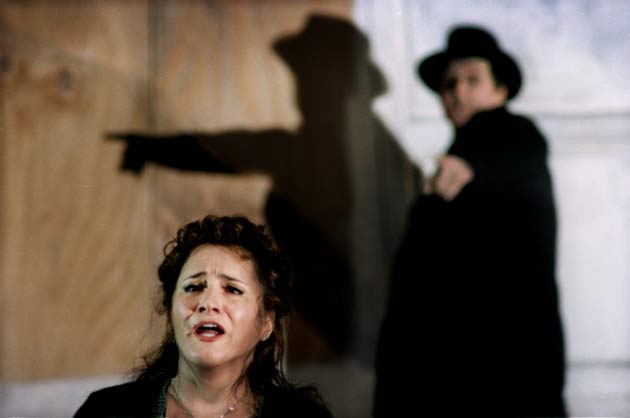Katya Kabanova, Coliseum, London<br/>Emanuel Ax/Dawn Upshaw, Barbican Hall, London
Costumes and hairpieces are no substitute for character

David Alden's English National Opera production presents Katya Kabanova as an Expressionist concentrate of silent screams and mucoid hawking. Its focus, like that of Alexander Ostrovsky's play, is the thunderstorm in Act III: electricity, according to the young schoolteacher, Kudrjas; a judgement from God, according to Dikoy, the grotesque caricature of Old Russia's merchant class. Judgement threatens from the first bars of Janacek's score, in the dry strokes of the timpani, so too the mauve depths of the Volga and the unchecked sobs of a woman spiralling to her death. Also there, though not in Alden's Munch-meets-Mayakovsky staging, is the heavy stillness of high summer and the weightless bliss of a stolen kiss.
Intervals serve a purpose beyond physical comfort. In Katya, that purpose is to allow the listener to lie on the riverbank with our lonely heroine and her weak lover, to suspend for a moment her headlong rush to oblivion. Eleven days pass between Tikhon's departure and Katya's confession, 11 nights with Boris. Yet here, as in Tim Albery's 2007 Opera North production, the momentum is not broken after Act II. Magnificent as Mark Wigglesworth's conducting is in its ferocity, every detail as sharp as the shadows cast by Adam Silverman's lighting on Charles Edwards's abstracted set, we are not permitted to hope that the lovers might escape. From our first sight of Katya (Patricia Racette), she is poised on a precipice, beaten by the impossibility of being an ideal wife and daughter-in-law to two people who cannot, will not, love her.
Much has been written of Janacek's muse, Kamila Stoss-lova, and her influence on Katya Kabanova. The slender, sad-eyed young woman photographed in 1917 soon disappeared behind a cladding of plumpness and prosperity, as Katya might have done had her marriage been less wretched. Cut Kamila out of the picture and each character can be seen as a facet of Janacek's nature: the dreaming soul, the hectoring tyrant, the cold husband, the sophisticated observer. Then there is the empty cradle. Is Katya barren? Is Tikhon impotent? Alden doesn't explore this. His villains are cartoonish, his heroine a hysteric lost in fantasies of flying, cathedrals and mountains, her husband (John Graham-Hall) as ineffectual as the Pekinese dog in Act I. Boris (Stuart Skelton), a preening, corn-fed capon, seals his conquest with a post-coital cigarette.
This, then, is not a tragedy of love crushed by provincial morality but a Freud and Breuer case study. Racette's voice is clear, strong, sincere. But there's no Slavic darkness (a big ask in an English translation), no turtledove tremulousness. Society is confined to a blur of umbrellas. The relationship between Alfie Boe's vital, independent Kudrjas and Anna Grevelius's bohemian Varvara is the only example of mutual kindness and candour. Elsewhere, instead of character, we have costumes and hairpieces: Skelton's mustard-yellow top-coat and waxed moustache, Susan Bickley's carapace of a chignon, topped with a hat like an angry diacritic. We don't learn what drives Kabanicha's fury, and with Clive Bayley's Dikoy spitting and scuttling across the stage like a furry beetle, there is something Roald Dahl-ish about both of them, Aunt Spiker and Mr Twit. Theatrically, vocally and orchestrally, Alden's Katya is arresting, impressively executed, very much in the company style. But by emphasising Expressionism over lyricism, its power is diminished.
For the final concert in his Barbican residency, Emanuel Ax shared the stage with Dawn Upshaw and Mr Melnyk. Mr Melnyk was invisible, of course, but Ax's first piano teacher was one of a breed celebrated in Stephen Prutsman's sweet-tempered song-cycle Piano Lessons: a setting of Billy Collins's poems on the mysterious world that opens out as a student progresses from five-finger exercises in the "open book" key of C to the "black boot" of G flat and beyond. The piano's "enormous moonlit smile" beamed through this intimate programme of songs, mazurkas and nocturnes, sung with warmth and wonder by Upshaw and played with delicacy and intelligence by Ax, each phrase gently curving into silence, with none of the angst and ego commonly associated with Chopin. An artful Schumann selection of songs closed with "Widmung", its pathos and joy ideally balanced.
'Katya Kabanova': (0871 911 0200) to 27 March
Subscribe to Independent Premium to bookmark this article
Want to bookmark your favourite articles and stories to read or reference later? Start your Independent Premium subscription today.

Join our commenting forum
Join thought-provoking conversations, follow other Independent readers and see their replies